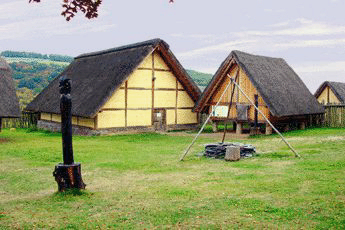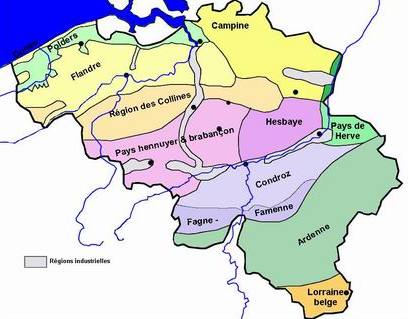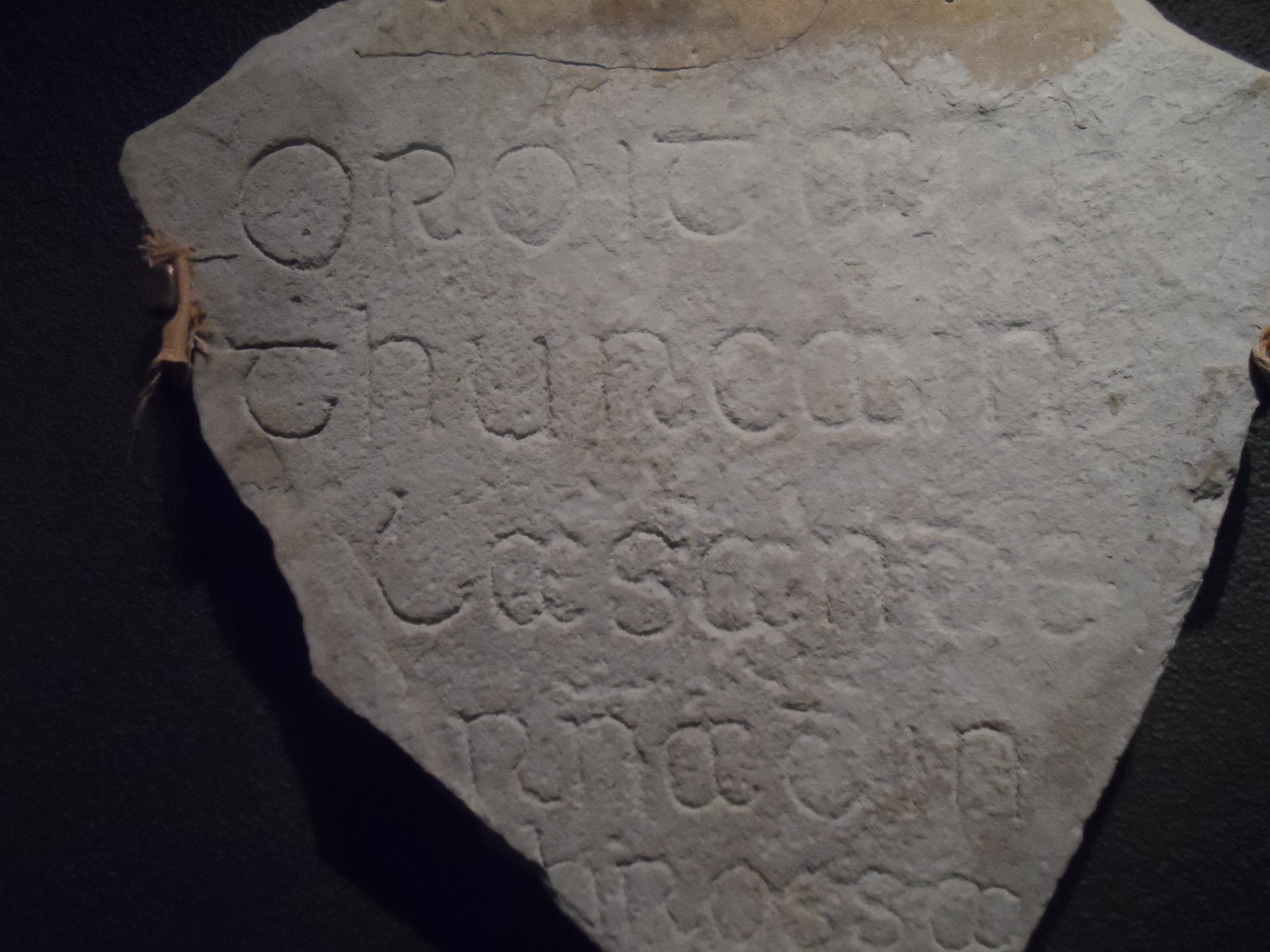|
Caeroesi
The Caerosi (or Caeroesi) were a small Belgic- Germanic tribe dwelling in Gallia Belgica during the Iron Age and the Roman period. Their ethnic identity remains uncertain. Caesar described them as part of the Germani Cisrhenani, but their tribal name is probably of Celtic origin. Like other Germani Cisrhenani tribes, it is possible that their old Germanic endonym came to be abandoned after a tribal reorganization, that they received their names from their Celtic neighbours, or else that they were fully or partially assimilated into Celtic culture at the time of the Roman invasion of the region in 57 BC. Name They are mentioned as ''Caerosos'' (var. ''ceroesos'', ''caeroesos'', ''cerosos'') by Caesar (mid-1st c. BC), and as ''Caerosi'' by Orosius (early 5th c. AD)., s.v. ''Caerosi''. The ethnonym ''Caerosi'' probably derives from a Proto-Celtic root reconstructed as ''*caer-'' ('sheep'; cf. Old Irish ''caera''), itself from an earlier ''*caper-'' (cf. Latin ''caper'', Old Norse ... [...More Info...] [...Related Items...] OR: [Wikipedia] [Google] [Baidu] |
Treveri
The Trēverī ( Gaulish: *''Trēueroi'') were a Celtic tribe of the Belgae group who inhabited the lower valley of the Moselle from around 150 BCE, if not earlier, until their displacement by the Franks. Their domain lay within the southern fringes of the ''Silva Arduenna'' ( Ardennes Forest), a part of the vast Silva Carbonaria, in what are now Luxembourg, southeastern Belgium and western Germany; its centre was the city of Trier (''Augusta Treverorum''), to which the Treveri give their name. Celtic in language, according to Tacitus they claimed Germanic descent. Tacitus writes, "The Treveri and Nervii are even eager in their claims of a German origin, thinking that the glory of this descent distinguishes them from the uniform level of Gallic effeminacy." '' Germania'' XXVIII. They possibly contained both Gallic and Germanic influences. Although early adopters of Roman material culture, the Treveri had a chequered relationship with Roman power. Their leader Indutiomaru ... [...More Info...] [...Related Items...] OR: [Wikipedia] [Google] [Baidu] |
Condrusi
The Condrusi were an ancient Belgic- Germanic tribe dwelling in what is now eastern Belgium during the Gallic Wars (58–50 BC) and the Roman period. Their ethnic identity remains uncertain. Caesar described them as part of the Germani Cisrhenani, but their tribal name is probably of Celtic origin. Like other Germani Cisrhenani tribes, it is possible that their old Germanic endonym came to be abandoned after a tribal reorganization, that they received their names from their Celtic neighbours, or else that they were fully or partially assimilated into Celtic culture at the time of the Roman invasion of the region in 57 BC. Name They are mentioned as ''Condrusos'' and ''Condrusi'' by Caesar (mid-1st c. BC), and as ''Condurses'' by Orosius (early 5th c. AD)., entry 1967. The meaning of the name ''Condrusi'' remains unclear. The prefix is most likely the Gaulish ''con-/com-'' ('with, together, as well'), and although the translation of the element ''-drus-'' is unknown, it is also ... [...More Info...] [...Related Items...] OR: [Wikipedia] [Google] [Baidu] |
Treverii
The Trēverī (Gaulish: *''Trēueroi'') were a Celtic tribe of the Belgae group who inhabited the lower valley of the Moselle from around 150 BCE, if not earlier, until their displacement by the Franks. Their domain lay within the southern fringes of the ''Silva Arduenna'' ( Ardennes Forest), a part of the vast Silva Carbonaria, in what are now Luxembourg, southeastern Belgium and western Germany; its centre was the city of Trier (''Augusta Treverorum''), to which the Treveri give their name. Celtic in language, according to Tacitus they claimed Germanic descent.Tacitus writes, "The Treveri and Nervii are even eager in their claims of a German origin, thinking that the glory of this descent distinguishes them from the uniform level of Gallic effeminacy." '' Germania'' XXVIII. They possibly contained both Gallic and Germanic influences. Although early adopters of Roman material culture, the Treveri had a chequered relationship with Roman power. Their leader Indutiomarus led ... [...More Info...] [...Related Items...] OR: [Wikipedia] [Google] [Baidu] |
Caeracates
The Caeracates (Gaulish: *''Caeracatis'', 'the shepherds' or 'sheep-folk') were small tribe dwelling in Gallia Belgica during the Roman period. Like the Aresaces, they were probably a sub-tribe (''pagus'') of the larger Treveri, since they were too small to form their own '' civitas''. Name They are mentioned by Tacitus (early 2nd c. AD) as ''Caeracatium'' and ''Caeracatibus''.Tacitus''. Historiae'', 4:70. The ethnonym ''Caeracates'' is a latinized form of Gaulish *''Caeracatis''. It derives from a stem ''*caerac''-, meaning 'ewe' or a similar animal (cf. Old Irish gen. ''caerach'' 'ewe', Welsh ''caeriwrch'' ' roe deer'), attached to the suffix ''-atis'' ('belonging to'). It thus means 'those of the sheep', that is to say 'the shepherds' or 'sheep-folk'. ''Caeracates'' is cognate with other Celtic tribal names such as the Belgic ''Caeroesi'', the Brittonic ''Caereni'', and the Pictish ''Kairênoi'' (Καιρηνοί). History Tacitus mentioned them in his account of the ... [...More Info...] [...Related Items...] OR: [Wikipedia] [Google] [Baidu] |
Belgae
The Belgae () were a large confederation of tribes living in northern Gaul, between the English Channel, the west bank of the Rhine, and the northern bank of the river Seine, from at least the third century BC. They were discussed in depth by Julius Caesar in his account of his wars in Gaul. Some peoples in Britain were also called Belgae, and O'Rahilly equated them with the Fir Bolg in Ireland. The Belgae gave their name to the Roman province of Gallia Belgica and, much later, to the modern country of Belgium; today "Belgae" is also Latin for "Belgians". Etymology The consensus among linguists is that the ethnic name ''Belgae'' comes from the Proto-Celtic root ''*belg-'' or ''*bolg-'' meaning "to swell (particularly with anger/battle fury/etc.)", cognate with the Dutch adjective ''gebelgd'' "very angry" (weak perfect participle of the verb ''belgen'' "to become angry") and ''verbolgen'' "being angry" (strong perfect participle of obsolete ''verbelgen'' "to make angry"), as w ... [...More Info...] [...Related Items...] OR: [Wikipedia] [Google] [Baidu] |
Middle Irish
Middle Irish, sometimes called Middle Gaelic ( ga, An Mheán-Ghaeilge, gd, Meadhan-Ghàidhlig), is the Goidelic language which was spoken in Ireland, most of Scotland and the Isle of Man from AD; it is therefore a contemporary of late Old English and early Middle English. The modern Goidelic languages— Irish, Scottish Gaelic and Manx—are all descendants of Middle Irish. Grammar Middle Irish is a fusional, VSO, nominative-accusative language. Nouns decline for two genders: masculine, feminine, though traces of neuter declension persist; three numbers: singular, dual, plural; and five cases: nominative, accusative, genitive, prepositional, vocative. Adjectives agree with nouns in gender, number, and case. Verbs conjugate for three tenses: past, present, future; four moods: indicative, subjunctive, conditional, imperative; independent and dependent forms. Verbs conjugate for three persons and an impersonal, agentless form (agent). There are a num ... [...More Info...] [...Related Items...] OR: [Wikipedia] [Google] [Baidu] |
Kyllburg
Kyllburg () is a town in the Waldeifel region in the district of Bitburg-Prüm, in Rhineland-Palatinate, Germany. It is situated in the Eifel mountains, on the river Kyll, approx. 10 km north-east of Bitburg. Kyllburg was the seat of the former ''Verbandsgemeinde A Verbandsgemeinde (; plural Verbandsgemeinden) is a low-level administrative unit in the German federal states of Rhineland-Palatinate and Saxony-Anhalt. A Verbandsgemeinde is typically composed of a small group of villages or towns. Rhinelan ...'' ("collective municipality") Kyllburg. Since 1 July 2014 it is part of the ''Verbandsgemeinde'' Bitburger Land. References Bitburg-Prüm {{BitburgPrüm-geo-stub ... [...More Info...] [...Related Items...] OR: [Wikipedia] [Google] [Baidu] |
Neidenbach
Neidenbach is a municipality in the district of Bitburg-Prüm, in Rhineland-Palatinate, western Germany. Geography Neidenbach lies about 45 km north of the city of Trier in the Kyllburger Waldeifel The Waldeifel or Kyllburger Waldeifel is a landscape region of the South Eifel in Germany along the middle and lower Kyll valley and its immediate surrounding area. The uplands vary in height from 300 to 500 metres above sea level. In the west th ... region. Within its municipality are the hamlet of ''Erntehof'' 2.5 km northwest of the village and the settlements of Koppenweg, Maierhof, Nickelshof and Am Wasserfall. [...More Info...] [...Related Items...] OR: [Wikipedia] [Google] [Baidu] |
Franks
The Franks ( la, Franci or ) were a group of Germanic peoples whose name was first mentioned in 3rd-century Roman sources, and associated with tribes between the Lower Rhine and the Ems River, on the edge of the Roman Empire.H. Schutz: Tools, Weapons and Ornaments: Germanic Material Culture in Pre-Carolingian Central Europe, 400-750. BRILL, 2001, p.42. Later the term was associated with Romanized Germanic dynasties within the collapsing Western Roman Empire, who eventually commanded the whole region between the rivers Loire and Rhine. They imposed power over many other post-Roman kingdoms and Germanic peoples. Beginning with Charlemagne in 800, Frankish rulers were given recognition by the Catholic Church as successors to the old rulers of the Western Roman Empire. Although the Frankish name does not appear until the 3rd century, at least some of the original Frankish tribes had long been known to the Romans under their own names, both as allies providing soldiers, and as e ... [...More Info...] [...Related Items...] OR: [Wikipedia] [Google] [Baidu] |
Ubii
350px, The Ubii around AD 30 The Ubii were a Germanic tribe first encountered dwelling on the east bank of the Rhine in the time of Julius Caesar, who formed an alliance with them in 55 BC in order to launch attacks across the river. They were transported in 39 BC by Marcus Vipsanius Agrippa to the west bank, apparently at their own request, as they feared the incursions of their neighbors, the Chatti. A colony for Roman veterans was founded in 50 AD under the patronage of Agrippa's granddaughter, Agrippina the Younger, who had been born at Ara Ubiorum, the capital of the Ubii. The colony derived its title from the names of Agrippina and her husband, the emperor Claudius, and received the name ''Colonia Claudia Ara Augusta Agrippinensium'', which is the origin of the city's modern name, Cologne. Alongside the allotment of land to veterans, the existing town of Ara Ubiorum was elevated to the status of a '' colonia'', which would have conferred many privileges on the inhabitants ... [...More Info...] [...Related Items...] OR: [Wikipedia] [Google] [Baidu] |
Eburones
The Eburones (Greek: ) were a Gallic- Germanic tribe dwelling in the northeast of Gaul, in what is now the southern Netherlands, eastern Belgium and the German Rhineland, in the period immediately preceding the Roman conquest of the region. Though living in Gaul, they were also described as being both Belgae and Germani (for a discussion of these terms, see below). The Eburones played a major role in Julius Caesar's account of his "Gallic Wars", as the most important tribe within the ''Germani cisrhenani'' group of tribes — ''Germani'' living west of the Rhine amongst the Belgae. Caesar claimed that the name of the Eburones was wiped out after their failed revolt against his forces during the Gallic Wars, and that the tribe was largely annihilated. Whether any significant part of the population lived on in the area as Tungri, the tribal name found here later, is uncertain but considered likely. Name Attestations They are mentioned as ''Eburones'' by Caesar (mid-1st c ... [...More Info...] [...Related Items...] OR: [Wikipedia] [Google] [Baidu] |
Paemani
The Paemani (also Poemani or Caemani) were a small Belgae, Belgic-Germanic peoples, Germanic tribe dwelling in Gallia Belgica during the Iron Age Europe, Iron Age. Their ethnic identity remains uncertain. Caesar described them as part of the Germani Cisrhenani, but a number of scholars have argued that their name may be of Celtic languages, Celtic origin. Like other Germani Cisrhenani tribes, it is possible that their old Germanic Endonym and exonym, endonym came to be abandoned after a tribal reorganization, that they received their names from their Celtic neighbours, or else that they were fully or partially cultural assimilation, assimilated to Celtic culture at the time of the Roman invasion of the region in 57 BC. Name Attestations The name appears as ''Caemani'' in Caesar's accounts (mid-1st c. BC), along with the variant ''Paemani'' or ''Paemanes''. One of the two variants may be a scribal error. Alternatively, scholar Peter E. Busse has proposed to interpret the forms ... [...More Info...] [...Related Items...] OR: [Wikipedia] [Google] [Baidu] |





